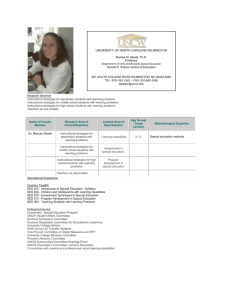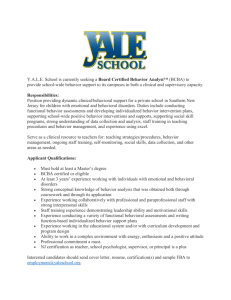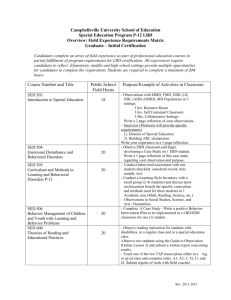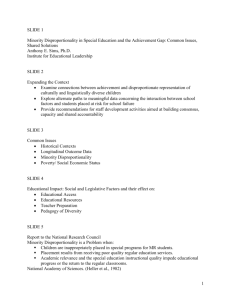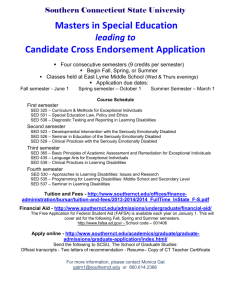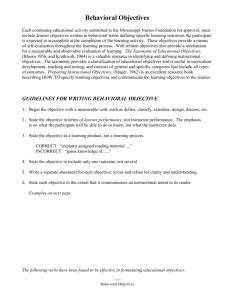master of arts in special education (m
advertisement
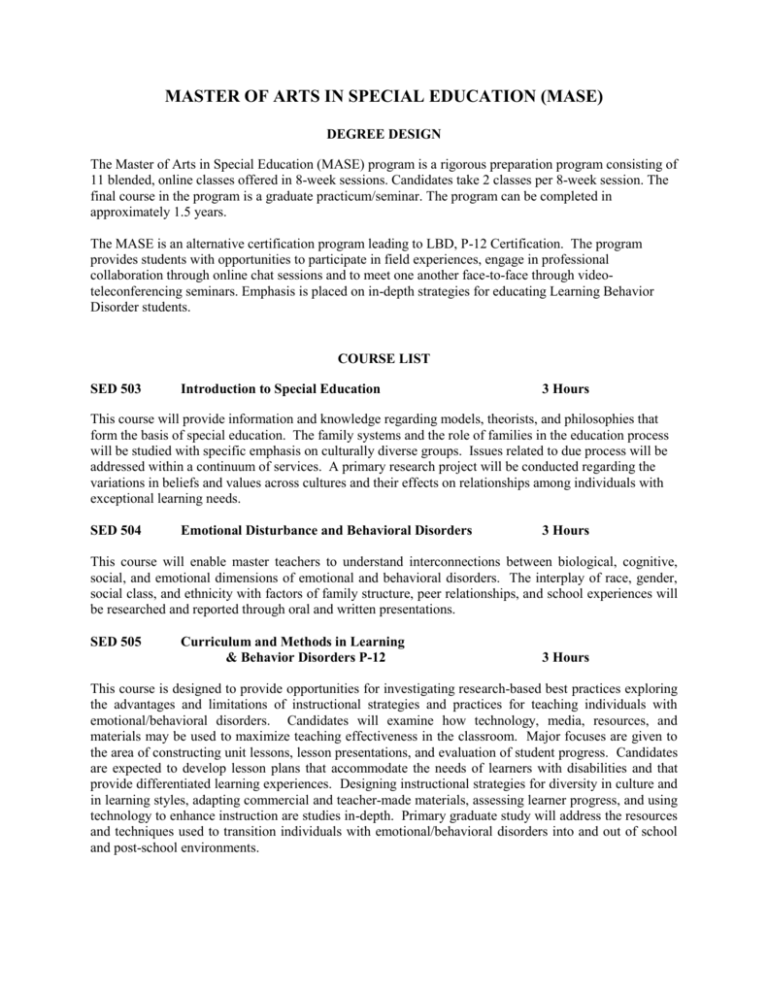
MASTER OF ARTS IN SPECIAL EDUCATION (MASE) DEGREE DESIGN The Master of Arts in Special Education (MASE) program is a rigorous preparation program consisting of 11 blended, online classes offered in 8-week sessions. Candidates take 2 classes per 8-week session. The final course in the program is a graduate practicum/seminar. The program can be completed in approximately 1.5 years. The MASE is an alternative certification program leading to LBD, P-12 Certification. The program provides students with opportunities to participate in field experiences, engage in professional collaboration through online chat sessions and to meet one another face-to-face through videoteleconferencing seminars. Emphasis is placed on in-depth strategies for educating Learning Behavior Disorder students. COURSE LIST SED 503 Introduction to Special Education 3 Hours This course will provide information and knowledge regarding models, theorists, and philosophies that form the basis of special education. The family systems and the role of families in the education process will be studied with specific emphasis on culturally diverse groups. Issues related to due process will be addressed within a continuum of services. A primary research project will be conducted regarding the variations in beliefs and values across cultures and their effects on relationships among individuals with exceptional learning needs. SED 504 Emotional Disturbance and Behavioral Disorders 3 Hours This course will enable master teachers to understand interconnections between biological, cognitive, social, and emotional dimensions of emotional and behavioral disorders. The interplay of race, gender, social class, and ethnicity with factors of family structure, peer relationships, and school experiences will be researched and reported through oral and written presentations. SED 505 Curriculum and Methods in Learning & Behavior Disorders P-12 3 Hours This course is designed to provide opportunities for investigating research-based best practices exploring the advantages and limitations of instructional strategies and practices for teaching individuals with emotional/behavioral disorders. Candidates will examine how technology, media, resources, and materials may be used to maximize teaching effectiveness in the classroom. Major focuses are given to the area of constructing unit lessons, lesson presentations, and evaluation of student progress. Candidates are expected to develop lesson plans that accommodate the needs of learners with disabilities and that provide differentiated learning experiences. Designing instructional strategies for diversity in culture and in learning styles, adapting commercial and teacher-made materials, assessing learner progress, and using technology to enhance instruction are studies in-depth. Primary graduate study will address the resources and techniques used to transition individuals with emotional/behavioral disorders into and out of school and post-school environments. SED 506 Behavior Management of Children & Youth with Learning and Behavior Problems 3 Hours This course is designed to provide students with knowledge and understanding of behavioral assessment and intervention strategies that have been effective for individuals with emotional/behavioral disorders across the age range. Students will learn to (a) identify and assess problem behavior, (b) design and implement behavioral interventions, (c) design learning environments that will prevent problem behaviors, and (d) apply behavioral procedures in educational settings. Primary research project will address the collaborative and consultative roles of the special education teacher in the reintegration of individuals with emotional/behavioral disorders. SED 600 Theories of Reading and Educational Practices P-12 3 Hours This course will concentrate on the best practices for teaching reading to students with learning and behavioral difficulties. Candidates will conduct research on literacy problems in the United States and examine reading approaches for students with reading difficulties. Understanding of best practice strategies for teaching of reading will be applied through a research paper project. SED 601 Prescriptive and Instructional Methods 3 Hours This course will explore strategies for teaching skills and content areas, such as reading, mathematics, social studies, oral and written language, and study skills to students with learning and behavioral disorders. The course will provide instruction in designing goals and objectives anchored in both general and special curricula. Primary graduate project will reflect candidates understanding of instructional planning in a collaborative context including individuals with exceptionalities, families, professional colleagues, and personnel from other agencies. This course will require a 10-hour field experience component. SED 602 Classroom Management 3 Hours This course will assist the candidate teachers in developing research-based strategies for creating and managing a classroom environment that maximizes student learning and prevents potential problems. Topics for in-depth study include: effective schools research; teacher behavior and management techniques; discipline theories; conferencing and referrals; observation, reporting, and communication skills. Candidates will observe, record, and analyze both teacher and student behaviors as they relate to the instructional program and learning environment during the required 6 Field/Service Learning Hours. A research paper will require the candidate to exam classroom management models. SED 603 Teaching Mathematics to Children & Youth with LBD 3 Hours The primary focus of this course is an in-depth examination of the teaching of mathematics to children with learning and behavioral disorders. The overall contexts in which these researched-based best practices are considered are the national curricular reforms in mathematics. Clearly, this course primarily attends to domains of pedagogy, and its relationship to subject matter, curriculum, and pedagogical content knowledge. Specific attention is provided in this course to the teaching that responds to the reform recommendations identified by National Council of Teachers of Mathematics (NCTM). Candidates will demonstrate their understanding of best practice mathematics instruction through a casestudy project. SED 604 Assessment and Instructional Methods 3 Hours This course will provide participants with an understanding and informed use of assessment data. It focuses on policies and procedures involved in the screening, diagnosis, and placement of individuals with emotional/behavioral disorders including academic and social behaviors. The primary research project will involve the assessment of appropriate and problematic social behaviors of individuals with EBD. SED 605 Research Methods and Procedures 3 Hours This course provides an overview of the research processes, with emphasis on finding, using, and evaluating social research. The course has embedded within the weekly lessons PowerPoint presentations for further explanation of key concepts and terms. Further, each week’s lesson/class concludes with a website to be explored and learn the key concepts. Students will learn the tools for qualitative and quantitative research. Your research topic must relate to students with disabilities and their needs. This project is to be an Action Research Proposal. A research paper of 25 plus pages is required for the course. SED 606 Introduction to Learning Disabilities 3 Hours This course will provide information focusing on the identification, instruction, and assessment of individuals with specific learning disabilities and learning differences. Special emphasis will be placed on the etiologies of learning disabilities and the medical factors that may impact the learning of individuals with learning disabilities. Participants will learn the psychological, social, and emotional characteristics of individuals with learning disabilities. A primary research project explores the impact learning disabilities may have on auditory processing skills and phonological awareness as they relate to individual reading abilities. SED 607 Graduate Practicum/Seminar 3 Hours This course provides an opportunity for students to apply best instructional practice in a field base setting with cognitive coaching from critical friends a cohort of peers in the seminar. This will provide opportunity to translate theory learned into practice. The students complete several projects demonstrating their knowledge and skills of the special education field. For those non-traditional students who have degrees but no teaching certificates, an additional course is required, SED 502. This course is taught on campus in the summer. SED 502 Foundation Courses: Design for Teaching 12 Hours This course experience is designed to familiarize the candidate with the broad field of education. Emphasis is given the historical, philosophical, and social foundations of education through research activities. In-depth study of developmental and learning theories will be conducted. Also candidates will demonstrate proficiency in instructional technology applications in the classroom. This block will include lecture, in-class presentations, role-playing, case studies, video analysis, guest speakers, cooperative learning tasks, and a variety of writing activities. The Foundation Courses include: Introduction to Education Concepts and Philosophy of Education Human Development and Learning Theory Instructional Technology 3 hrs 3 hrs 3 hrs 3 hrs SED 608 Student Teaching 12 Hours Student teachers spend sixteen weeks in a primary, middle or high school classroom setting. They will have opportunity to translate theory learned in professional studies into practice while teaching in their areas of certification and under the guidance of a cooperating teacher and university supervisor.
